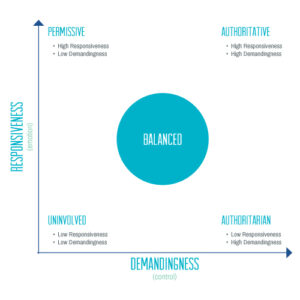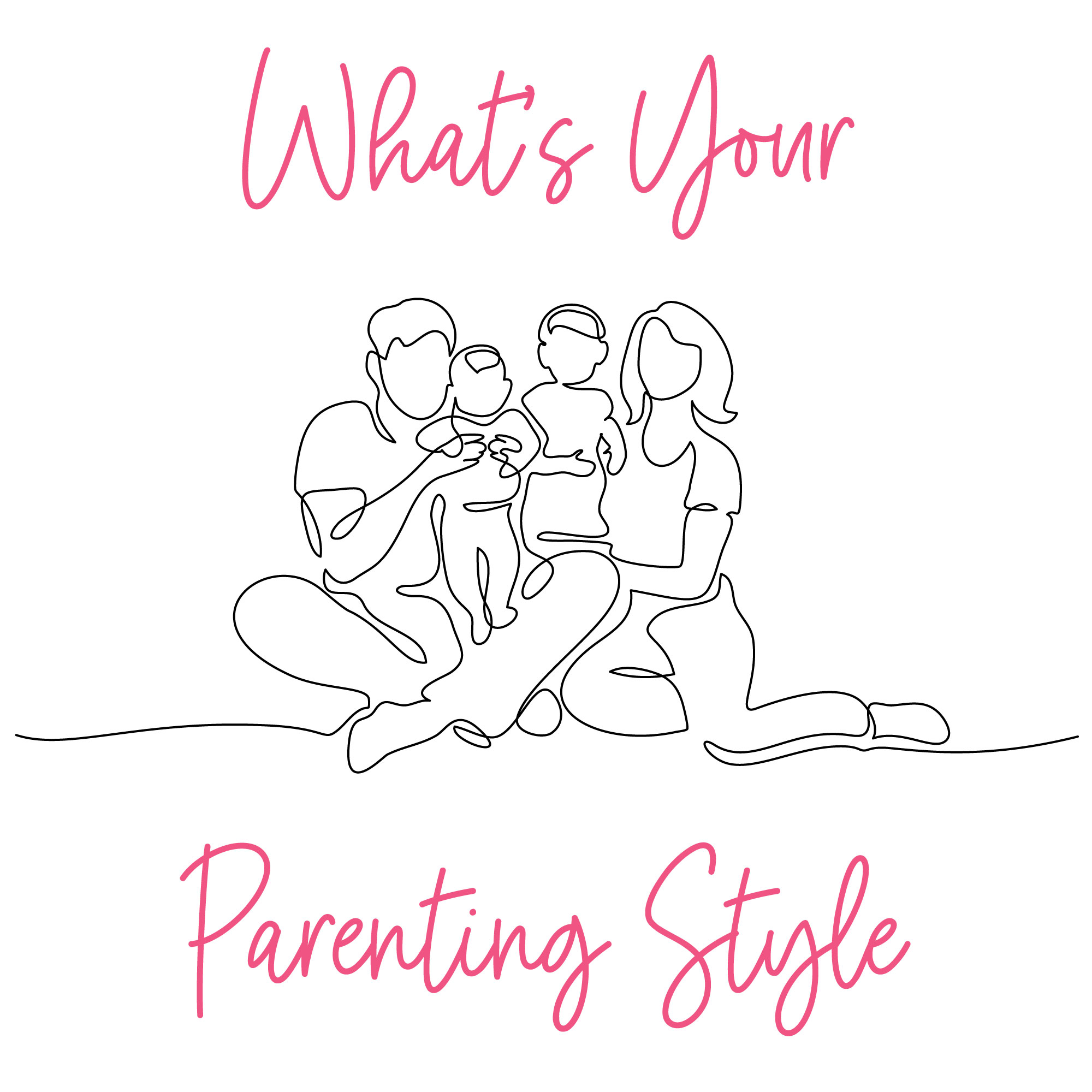Here’s a random fun fact about me: I love all things dessert. In fact, in my previous life, before I went back to school to further my career, I ran a bakery. It’s not only where I began my life as a professional but it’s also where I developed my love for the phrase, “That’s why they make chocolate and vanilla”.
Put simply, this phrase means not everyone likes the same thing. Not everyone has the same taste and not everyone does things exactly the same. Today I thought I’d use my favorite phrase to discuss parenting. We don’t all parent the same…so what happens when you and your partner have different parenting styles?
First, What is a Parenting Style?
You may never have thought of this concept before, but we each have a unique parenting style that we use when dealing with our children. These styles ultimately affect everything from how your child behaves, to how you feel about your child, to how they feel about themselves.
Ideally, you want to have a parenting style that support healthy growth and development. You want to be there for your child to love and encourage them, placing them on a path that will make them successful in their future endeavors. But you also need to provide structure and discipline. So how do you decide what to do?
There are 2 main components to parenting: responsiveness and demandingness. Responsiveness refers to how accepting and sensitive a parent is to their child’s emotional and developmental needs. Demandingness refers to the extent to which a parent control’s their child’s behavior or demands maturity.
While both components are desired, parenting styles were developed based on the varying degrees to which parents engage in each component. Dr. Diana Baumrind was the developmental psychologist who began to study parenting styles in the 1960s. By 1983 psychologists Maccoby and Martin expanded on her studies, determining the current 4 categories of parenting:
4 Parenting Styles
1. Authoritative
(high responsiveness, high demandingness)
Parents have rules and use consequences however they also take their child’s opinions into account. They validate their child’s feelings but make it clear that the adult is ultimately in charge. Parents display affection for their child and establish clear boundaries of what is and is not acceptable. They believe in open communication and natural consequences.
2. Authoritarian
(low responsiveness, high demandingness)
Parents are strict and exert high levels of control over their children. They typically use punishment instead of discipline, spending little if no time teaching a child how to make better choices. Parents show little warmth and tend to engage in one-way communication, often disregarding their child’s social emotional and behavioral needs.
3. Permissive
(high responsiveness, low demandingness)
Parents show love and warmth but have limited boundary setting. They are typically lenient and only step in when a severe issue has occurred. Parents tend to give in to tantrums and usually take on more of a friend role than a parent role. Rules are rarely enforced and overindulgence is used to avoid conflict.
4. Uninvolved
(low responsiveness, low demandingness)
Parents have little knowledge of what their child is doing. There are typically no rules or boundaries and little to no interest in the child. Children are pretty much expected to raise themselves. Parents are indifferent to their child’s social-emotional and behavioral needs.
Do all parents fit neatly into 1 parenting style?
The short answer…of course not. An Authoritative parent can absolutely display more Permissive or even Authoritarian tendencies depending on the situation. We are human. Yet, we as parents do typically lean more toward one style than another.
Which one is the best?
This is where things can get tricky in my opinion. According to 50+ years of research, psychologist and psychiatrist have determined that the Authoritative style is the most beneficial to both parents and children. Children raised by parents that have an Authoritative style appear happy and content, independent, active, and develop good self-esteem. In addition, they typically have good social skills, experience better mental health overall, are less violent and display secure attachment.
However so much has changed over the past 50+ years. Think about it…50 years ago was 1972…the 70’s! The way our society and communities have changed and developed over these past 50 years is immense. There were no personal computers let alone smart phones in the 1970s. Car seat laws didn’t exist. Babies came home from the hospital on their mother’s laps!
So how can we continue to state that a parenting style that was defined in the 1960s is still the desired style today, in 2022?
The Balanced Style
This is where I have inserted a 5th parenting style…the Balanced style. A Balanced parent is neither only high or low on both the responsiveness and demandingness components. Rather they are moderate in both, fluctuating within a continuum. The Balanced parent is nurturing and responsive to their child. Yet they allow the child to still experience difficult emotional states. Experiencing difficulties and figuring out how to overcome them are what help build coping skills for the future. So, a Balanced parent doesn’t ‘fix’ all uncomfortable situation, rather the help the child through the experience to find their own way to feeling more comfortable again.
 Additionally, the Balanced parent sets clear boundaries and limits for their child. They allow for open communication and encourage a child to express themselves, acknowledging the child’s experiences. But they won’t give their child the sense that their input was used in decision making. Because ultimately the parent has made the decisions based on expectations. They can acknowledge a child’s disappointment that they’re not getting their way, but the parent will display consistency and follow-through with their original boundary.
Additionally, the Balanced parent sets clear boundaries and limits for their child. They allow for open communication and encourage a child to express themselves, acknowledging the child’s experiences. But they won’t give their child the sense that their input was used in decision making. Because ultimately the parent has made the decisions based on expectations. They can acknowledge a child’s disappointment that they’re not getting their way, but the parent will display consistency and follow-through with their original boundary.
The Balanced parent understand a child’s emotional development as well as the need for consistent boundaries. They are focused on creating a balanced child…one that will learn to experience their emotions in a functional manner and manage their own expectations.
Understanding your Own Parenting Style
I have always had my opinions – both personally and professionally – about how to respond to my children when they are acting out and how to encourage them to be their best self. As a professional working in child development, I know why some behaviors happen and how I should handle the situation. As a parent and human sometimes I’ve just had it…I’m at my wit’s end and I cannot deal with P and her 4 ½-year-old behavior. I need to take those deep breaths, maybe excuse myself for a moment, so that I can effectively address the situation.
Have you thought about your own parenting style? Based on the descriptions above, do you feel that you fall into one category more than another? If you don’t know, start by thinking about the positive side of parenting. How do you respond to your child when positive things happen? Now look at the other end of the spectrum…how do you typically respond when they act out? Here’s a handout that I created to give you further explanation of the parenting styles.
Conflicting Parenting Styles
Knowing your own parenting style can be very helpful when discussing parenting expectations with your partner. Parenting is hard enough on one parent. What happens when your style of parenting is different from your partner’s? If you are authoritarian and they are permissive? What if you see no positive impact in disciplining your child when your partner wants to punish them?
Differences in parenting styles can have a tremendous impact on relationships. Even if you share the same parenting style, you are likely to at some point disagree about how to handle a particular situation. So, what do you do?
Support is Key
I believe first and foremost, try your best to present a united front. There is no better opportunity for a child to act out or manipulate a situation than when parents are disagreeing or arguing. Remember, our kids feed off of us. If we are anxious, they sense that. If we are sad or upset, they feel that too. They may not be old enough to say it, but they sure will show you through their actions and behaviors.
Whether you agree or not, supporting each other is key. You don’t always have to have the same opinion as your partner to back them. If your partner disciplines your child and you don’t necessarily agree with it, you need to throw that oppositional thought away for the time being and support your partner. Again, you need to be a united front. If you disagree with your partner’s decision in the moment, in front of your kids, you’ve just completely thrown them under the bus.
Talking it Out
Sometimes you may think that you two are on the same page, but a situation will arise and suddenly you find yourself disagreeing with what your partner has just said. You can absolutely disagree with your partner…in private. Away from your kids. And you should express your feelings because you don’t want to set up resentment and anger and leave it unaddressed.
When the kids are out of earshot, and things have calmed down, discuss the situation with your partner. Find out why they did what they did. And if you still disagree, discuss that with them. Have a productive conversation about your parenting styles. Establish some basic ground rules for moving forward and support each other in adhering to these rules.
Chocolate and Vanilla
The more you and your partner communicate with each other, the more likely you will be able to present a united front to your children. You may never agree but that’s why they make chocolate and vanilla.
In the end try to remember that you will only be stronger as a team if you understand each other. After all, if you can’t choose between chocolate and vanilla, there’s always the Neapolitan option. 😊

